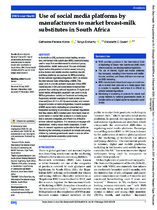| dc.contributor.author | Pereira-Kotze, Catherine | |
| dc.contributor.author | Doherty, Tanya M. | |
| dc.contributor.author | Swart, Elizabeth Catherina | |
| dc.date.accessioned | 2021-01-04T08:47:53Z | |
| dc.date.available | 2021-01-04T08:47:53Z | |
| dc.date.issued | 2020 | |
| dc.identifier.citation | Pereira-Kotze, C. et a. (2020). Use of social media platforms by manufacturers to market breast-milk substitutes in South Africa. BMJ Global Health, 5(12),e003574 | en_US |
| dc.identifier.issn | 2059-7908 | |
| dc.identifier.uri | 10.1136/bmjgh-2020-003574 | |
| dc.identifier.uri | http://hdl.handle.net/10566/5527 | |
| dc.description.abstract | In South Africa (SA), exclusive breast feeding remains rare, with breast-milk substitutes (BMS) commonly being used in ways that are detrimental to infant and young child nutrition, health and survival. The use of internet, digital and mobile platforms has increased, including in low-income and middle-income countries, like SA and these platforms are avenues for BMS marketing. SA has national legislation (Regulation R991) to enforce the International Code of Marketing of BMS. This paper aims to provide pertinent examples of how BMS manufacturers in SA use social media to market their products thus violating national regulations. A digital (and social media) ethnography approach was used to study BMS organisations' activity on Facebook and Instagram. | en_US |
| dc.language.iso | en | en_US |
| dc.publisher | BMJ Publishing Group | en_US |
| dc.subject | Child health | en_US |
| dc.subject | Breast milk | en_US |
| dc.subject | Nutrition | en_US |
| dc.subject | South Africa | en_US |
| dc.subject | Health policy | en_US |
| dc.title | Use of social media platforms by manufacturers to market breast-milk substitutes in South Africa | en_US |
| dc.type | Article | en_US |

